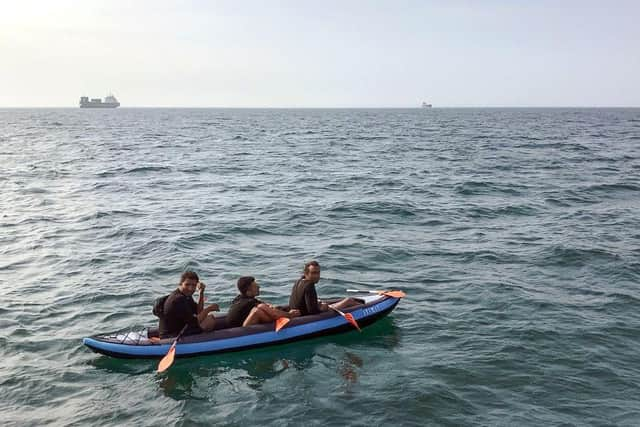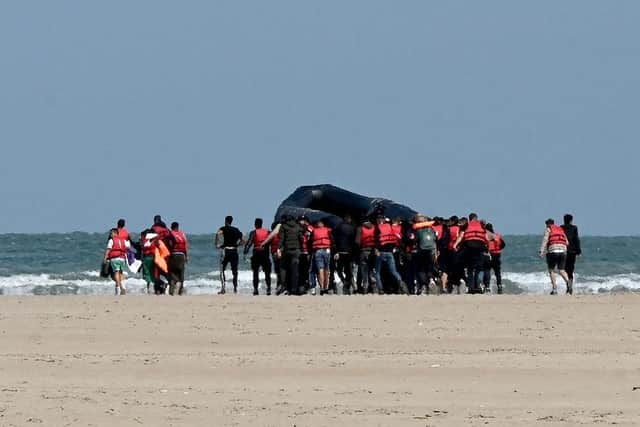'NI risks becoming a safe haven for mass immigration': DUP tries to add clause to Rwanda bill to guarantee it will apply to whole UK
and live on Freeview channel 276
It has tabled an amendment to the bill, which is being debated in the Commons this week, to make it clear that the Northern Ireland Protocol cannot be used to hobble its implementation in Northern Ireland if it becomes law.
The amendment is expected to be heard sometime on Wednesday afternoon and is short and simple; it seeks to add these words to the bill: “The provisions of this Act shall have effect in Northern Ireland”.
Advertisement
Hide AdAdvertisement
Hide AdSpecifically, the DUP thinks this is needed in case Section 7A of the 2018 Withdrawal Act is used by asylum advocates to nullify the Rwanda plan’s effect in the Province.


Section 7a activates Article 4 of the Withdrawal Agreement, which in turn says that if a conflict arose between UK law and EU law under the Northern Ireland Protocol, then the EU law would over-ride the UK one.
If that were to happen, it would be another example of Northern Ireland and Great Britain splitting apart from one another in law after Brexit.
The Northern Ireland Human Rights Commission has already launched a legal challenge to another piece of law, the Illegal Migration Act 2023, arguing that it violates EU laws (that act means anyone who arrives illegally in the UK can’t claim asylum).


Advertisement
Hide AdAdvertisement
Hide AdGiven all of this, DUP MP Sammy Wilson has argued that it is “fairly obvious that Northern Ireland could become a back door” to migrants who want to enter Great Britain, if asylum law ends up being less tough here than in England, Scotland, and Wales.
Echoing this, Jamie Bryson’s body The Centre for the Union has issued a paper today analysing the Rwanda plan.
The paper, which Mr Bryson says has the blessing of Ian Paisley MP, states that “if the Protocol applies with unabated force” then “those in Northern Ireland will be able to claim greater protections to frustrate the UK’s immigration policy than those in Great Britain”.
“It risks creating a safe haven for mass immigration, and more crucially could conceivably lead to a situation whereby this creates a ‘people’ border between Northern Ireland and Great Britain with infrastructure or checks to prevent the free movement of people within the UK,” it states.
Advertisement
Hide AdAdvertisement
Hide AdThis is a reference to the idea that if Northern Ireland does become such a “safe haven”, then the London government could institute tight checks on citizens from Northern Ireland who cross over the Irish Sea – creating an even more pronounced “Irish Sea border”.
As the News Letter has previously reported, Belfast accepts a vastly disproportionate number of asylum seekers relative to other cities:
– WHAT ACTUALLY IS THE RWANDA PLAN? –
The Rwanda plan has been floundering ever since Boris Johnson unveiled it in April 2022.
The idea behind it is that the UK government would pay the Rwandan government about £120m to accept asylum seekers who arrive in the UK.
Advertisement
Hide AdAdvertisement
Hide AdThey would be flown out to Rwanda and be housed there while their asylum claims are processed and, if successful, they would be resettled in Rwanda and barred from re-entering the UK.
The argument is that if people are genuinely turning up in the UK seeking safety from an imminent threat like war or government persecution, then relatively peaceful and stable Rwanda should suffice as a safe haven, albeit that the country is poor.
Though often called simply the Rwanda bill, the full title of the law being debated in the Commons this week is “the Safety of Rwanda (Asylum and Immigration) Bill”.
It should be stressed that the Rwanda scheme is only meant to deal with asylum seekers, and asylum seekers make up only a fraction of the immigrants who come to the UK.
Advertisement
Hide AdAdvertisement
Hide AdIn other words, even if it passes, the government’s bill would do little to affect the rate of general immigration, which has soared in recent years.
Government data shows that during 2022 there were 81,130 applications for asylum, covering roughly 100,000 individual asylum seekers.
The top nationalities claiming asylum were Albanian (14,200), Afghan (10,000), Iranian (7,600), Iraqi (4,100), and Syrian (3,700).
Many of those asylum applications would have came from the 45,774 people who were detected arriving in so-called small boats across the English Channel that same year.
Advertisement
Hide AdAdvertisement
Hide AdIn fact the nationality of asylum claimants above closely mirrors the proportion of people caught arriving in small boats; the top nationalities of small boat arrivals in 2022 were Albania (12,700), Afghanistan (9,100), Iran (5,800), Iraq (4,600), and Syria (3,000) according to the Home Office.
– GENERAL IMMIGRATION DWARFS ASYLUM CLAIMS –
But the Office for National Statistics shows that the overall net immigration to the UK during 2022 (that is, the total number of people arriving minus the number leaving) was 745,000: a figure that is massively higher than in previous years.
Over the last decade net migration to the UK typically ranges between a minimum of around 100,000 per year to a maximum of 300,000.
Of the 745,000 people who came to the UK in 2022, about 420,000 were on study visas while another 283,000 were on work visas, with the rest being mainly a mix of asylum claimants and UK nationals coming home.
Advertisement
Hide AdAdvertisement
Hide AdThe top nationality of immigrants generally, including students, was Indian (253,000), followed by Nigerian (141,000), Chinese (89,000), and Pakistani (55,000) according to Home Office data from mid-2023.
Often overlooked in the discussion of migration is the impact of population loss on migrants' home countries.
For example, Border Force's Clandestine Channel Threat Commander Dan O'Mahoney said that in the year to October 2022 some 12,000 Albanians had arrived in the UK on small boats, "of which about 10,000 are single adult men".
"To put that in context,” he said, “that number of 10,000 – depending on how you classify that – means that between 1% and 2% of the entire adult male population of Albania has travelled to the UK in small boats."